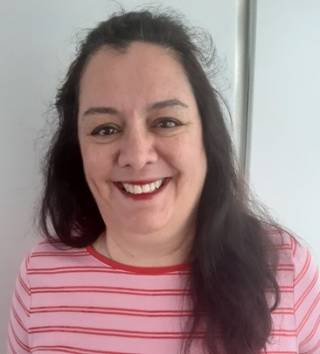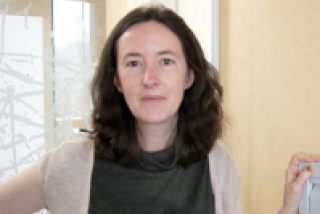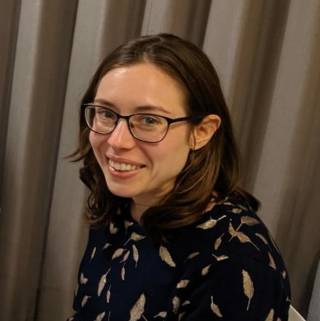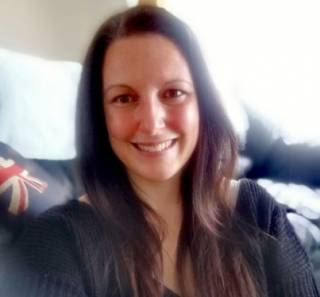The Division of Psychiatry celebrates colleagues for Women's History Month
29 March 2021
Welcome to our Division of Psychiatry special news piece to mark the end of Women’s History Month.
Given evidence of the disproportionate effects of the pandemic on women working in academia, now more than ever, we need to celebrate and support the contributions that women make in the division and academia in general.
Five women who are staff or students in the Division of Psychiatry chatted to the gender equity lead, Gemma Lewis, about life and work during lockdown, equality diversity and inclusion, and their dream dinner party guests. Have a look at our Discussion Corner, which includes topics ranging from parenting, gender, race and class to Netflix and Bill Bailey.
We also include links to some interesting articles promoting the work of women in academia.
 Paula Beharry, Administrator, Professional Services
Paula Beharry, Administrator, Professional Services

What have been the biggest challenges or triumphs for you whilst working during the pandemic?
On a personal level it was having 2 sons whose GCSE and A level exams were just cancelled in one fell swoop. So, I had two aimless teens at home whilst I was trying to get to grips with working from home; but the good thing was they had each other! I had some technical issues – when I used VPN it would affect my husband’s access to the internet, and it would really mess up our home computer. After a long chat with IT, I was told to only use desktop. I never knew I would become so conversant with internet terminology. I believe IT and internet stability has been the biggest challenge. When lockdown was enforced again in January, we realised that we didn’t have enough computers in the house. My son had to have some zoom lessons and I had to work, albeit part-time. At first we thought we could work around each other but that was a mess, so we had to buy him a laptop. It made me so aware of digital poverty. I am lucky to be able to do that, but some kids are working from mum’s mobile phone. It’s a serious issue.
A triumph happened early in lockdown. The ANTLER study, which I work on, were hosting an end of study conference and really wanted patient participation. We had an elderly gentleman who was really keen to attend the zoom meeting, but his computer was not up to date enough for him to join in. He went out and bought some speakers and I spent 2 days, including one session of 90 minutes, taking him through the process of opening a zoom meeting. We had our own little practice and then he was ready. Him being able to join the meeting as a spectator was my triumph of 2020.
You joined the new DoP Race Equity and Ethnic Diversity (REED) group, and you have a lot of experience working in academia. What was your motivation for joining REED and how would you summarise your thoughts on diversity and academia at the moment?
I was really pleased with the creation of the REED group. The department responded very quickly to the reactions and fallout from the murder of George Floyd and the outpouring of grief and anger that followed. The Black Lives Matter voices made it difficult for people to ignore issues around racism. In a strange way, lockdown meant there was time to reflect and take in what was being said. There were less distractions from everyday life, so people often had time to stop and think about their own role in a racist society. My motivation stems from personal experience, as no doubt does everyone’s. I am Irish/Asian and have a spectrum of experiences. Despite going to school in Brixton, because I looked more Asian I was called abusive names occasionally. During the 1970s IRA bombing campaign, my mother was scared to speak on the bus as she’d be abused for her Irish accent. Later on, when people perceived me to be white, they would ‘reveal’ casual racism to me. They weren’t as guarded as they would have been in other company. I have been aware of, or involved with, racial and gender politics all my adult life. I have come to realise that I may feel like I am on the periphery of ‘mainstream’ society but actually there are tonnes of people out here with me. To be honest, it’s difficult to find people who aren’t marginalised for one reason or another. I am a joiner, a big believer in trying to be part of the solution, and not just complaining about the problem.
I have worked in academia for over 20 years and I have seen changes, but I have also seen things stubbornly stay the same – just the goal posts move. For all my discussions around gender and race I personally believe the other dominating factor at work is class. I have only worked in the Medical School and often the people of colour and women I encountered in academic roles went to the same private schools as those employing them. I acknowledge this is a simplified observation, and doesn’t apply to all the academics but it was noticeable. I was delighted when I joined Psychiatry to see so many female professors and more than one black face. A lot of large institutions like the BBC or the NHS often employ black people at the administrative or lower levels, but not in management or professional level. I am hoping that with REED and EDI activity, UCL can work to rise above this practice. I have seen improvements in the student intake, they appear to be more diverse and one result is that students are starting to speak out and say they want to see people like them teaching them. University is a wonderful opportunity to encounter a huge variety of people, and this can be reflected in the staff as well as the student body.
What have you found helps with your mental health or well-being during the pandemic?
I found working and contact with others has helped me, and the luxury of having a small garden. When lockdown began there were four of us in the house, so we were quite chirpy. I also had adult company. I heard of single parent families where, although in the company of little people, the parent craved seeing or speaking to another adult. I face-timed a friend once a week – we booked the time in, and would have a chat about how we’d done nothing that week! The two teams I worked with both met fortnightly so that was a good connection to work and the wider world. We often started the meeting talking about lockdown hair and what we could/couldn’t get at the shops. I took a lot of this for granted. I felt quite happy working, chatting and siting in the garden. It wasn’t until I spoke to some women in my book group and some retired people from church that I heard of the loneliness of others. I felt guilty that I hadn’t really encountered this, or thought about how others were experiencing the lockdown. The discipline of having to get up and do work at the kitchen table was such a positive thing. It gave my week structure and made me feel useful. The good weather helped tremendously – we went for lots of walks around Clapham Common. I didn’t do Couch to 5k like the rest of my family… from couch to couch potato more like!
Who would be your dream dinner party guests?
I would invite Eliza Bennett (as its a dream, I presume fictional characters can come along), Maya Angelou, The Obamas, Greg Davies (it seems he always has so many mad stories to tell). I might be too in awe of the Obamas to engage but hopefully Michelle would be chatty. Maybe Adele if she agreed to sing as well as chat. It’s an eclectic mix but I’m sure they’d all get along.
 Claudia Cooper, Professor in Old Age Psychiatry
Claudia Cooper, Professor in Old Age Psychiatry

What have been the biggest challenges or triumphs for you whilst working during the pandemic?
As this is a work article, I shall give a work-orientated answer, though as I have three kids at primary school, school closures have also brought challenges. I have autonomy over my working day, which many do not, and in the second closure I took up key worker places, but losing childcare support overnight while work continues is very hard, disproportionately for women.
In March 2020, we were about to start the NIDUS psychological intervention trial for people with dementia and their carers. To cut a long story short, we switched to remote delivery and continued, with lots of positive feedback from participants. I feel proud of how as a team we adapted, and looked after each other and the participants. The NIDUS research assistants wrote a blog about their experiences during this time https://www.alzheimers.org.uk/blog/dementia-care-research-coronavirus-lo.... Our Centre of Excellence funding has just been successfully renewed until 2023 so we will be able to continue this important work.
We also adapted the NIHR/ESRC-funded APPLE-Tree dementia prevention trial to group video-call. We made videos to replace planned face to face cookery demonstrations in our kitchens (the kids helped, it made a change from home schooling!), and worked out ways to make it as easy as possible for older people unfamiliar with technology to be included. The intervention’s focus on wellbeing has felt pertinent in lockdown and it’s good to hear about positive lifestyle changes participants have made, and how they are supporting each other through the groups, and a relief to hear they are enjoying the home videos! And we hope the intervention with improve their cognition, our primary outcome, longer term.
With support of trial managers Larisa, Jessica, and Michaela, I’ve tried to make our NIDUS/APPLE-Tree team a good place to work, where people feel they are treated fairly. We have offered all the research assistants an opportunity to work flexibly and encourage everyone to share their ideas for how we can do things better. We’ve stayed connected socially, with well-attended zoom wine nights and coffee mornings – in late May we plan a team picnic– it will be good to meet in real life again, with some colleagues for the first time.
What is it like being a woman in academia? Have there been times when you have either faced inequality or had to challenge it?
I find it a fun and interesting career and enjoy work with many wonderful colleagues. At times I’ve been treated in ways I found unacceptable, which may not have happened to a man in the same way. The gender EDI team has necessary and important work ahead, and I hope I can help.
What have you found helps with your mental health or well-being during the pandemic?
My husband, children, family and friends; working with people I look forward to seeing on teams; reading and Netflix. And people around me who listen when I’m having a bad day and trust me to listen when they are too.
Who would be your dream dinner party guests?
Possibly Ben Fogle - his presence might indicate we’ve taken the plunge and escaped to remote wilderness, although I think the family would struggle with that for more than a few weeks. Jacinda Ardern, Sandi Toksvig; and Bill Bailey. That would be quite a night wouldn’t it!
 Natalie Shoham, Clinical Training Fellow and PhD Student
Natalie Shoham, Clinical Training Fellow and PhD Student

What have been the biggest challenges or triumphs for you whilst working during the pandemic?
I think the biggest triumph was working in some fantastic teams! The biggest challenge initially was probably knowing whether to admit someone to a ward when there was a risk of a covid outbreak there.
What tips would you share with other PhD students navigating their studies during the pandemic?
- Ring IT for help setting up on day 1.
- Go for a walk at lunchtime.
- Try to get hold of a proper desk (I learnt from my own mistakes!)
What have you found helps with your mental health or well-being during the pandemic?
Running, chocolate, and playing silly games over zoom with friends and family.
Who would be your dream dinner party guests?
It'd be a dream to have dinner with almost anyone at the moment. I'd invite James Acaster because we'd all laugh. Also, if she was still alive, I'd invite 'notorious' Ruth Bader Ginsberg because she was amazing.
 Sarah Rowe, Associate Professor, Lecturer in Mental Health Sciences
Sarah Rowe, Associate Professor, Lecturer in Mental Health Sciences

What have been the biggest challenges or triumphs for you whilst working during the pandemic?
The biggest challenge for me during the pandemic has been juggling work and childcare. I am a single mum to a 21-month old boy and have been fortunate enough to have childcare three days a week, but it has still been difficult managing the demands of moving teaching online, with the responsibilities of my home life. This has probably been the most intense work year I’ve ever experienced, as we have 135 MSc students, and I was responsible for coordinating the compulsory module which was running online and face-to-face sessions ten times per week. This was also one of my triumphs - the module ran very successfully and I think that the changes that we made to adapt the teaching to running online, have improved our delivery of the module. I’m really proud of what our MSc teaching team has achieved, particularly under the circumstances. My other biggest triumph is the time that I get to spend with my son. The truest words I’ve ever heard about parenting are “the days are long, but the years are short”. Although it can be tiring, he is growing up very quickly and I treasure the small things we do together like kicking a ball, blowing bubbles and having him help to hang out the washing! He has also joined me on a lot of zoom meetings which I think is great for breaking down barriers and normalising family life within academia.
You’ve recently joined the DoP gender equity group, and we’ve had some interesting conversations about Equality, Diversity, and Inclusion, in particular about class. Can you summarise some of your thoughts about class and academia at the moment?
I am originally from New Zealand and have lived in England for the past 10 years. I was the first in my family to finish high school and the first to go to university. New Zealand has eight universities and if you went to any of them, you were doing pretty well. Before I came to England, I had no idea what a Russell group university was or what people were referring to when they were talking about Oxbridge. The emphasis on class and the importance of which university you went to was quite shocking to me and sometimes makes me feel very uncomfortable. Within diversity and inclusion, we talk a lot about gender and race but there doesn’t seem to be much discussion about class, despite the intersection between these things. Class has an impact on your knowledge, networks, opportunities, finances and support, whether you’re studying at university or forging an academic career. It can be really challenging being a first-generation university student or academic and not having any insider knowledge – everything you do is starting from the ground up. On top of that, there’s lots of complex feelings that arise with coming from a working class background but working within academia. The obvious one is imposter syndrome, but there’s also other feelings like guilt (that you might be moving too far away from your roots), gratitude (that you get to work with inspiring people on interesting topics), and insecurity (feeling uncertain about where you ‘fit’ in your different worlds).Throughout my career, I have been very fortunate to have senior people informally mentoring me and I think this has made a big difference in overcoming some of the barriers I faced coming from a working-class background. I think this could be done more widely to support first generation staff and students in the future.
What have you found helps with your mental health or well-being during the pandemic?
Finding time for myself is difficult, verging on impossible! With so many other priorities, the thing that tends to fall low on the list is self-care, which isn’t a good thing. Ideally, I would love to go for a run as I find exercise really beneficial but instead, I’ve had to redefine what my self-care looks like. I go out almost every day for walks with my son which keeps me active. Because I work flexibly, I regularly work in my evenings when the little one has gone to bed. To make sure I get a break, I don’t do any work over the weekend, which should be the norm but often isn’t in academia. I am in contact a lot with my friends and family which keeps me feeling connected to everyone. On the rare occasions that I get some down time, I do as little as possible and it is amazing!
Who would be your dream dinner party guests?
My friends and family. I know it’s typical to say someone famous or academic when answering this question but that doesn’t really interest me! The people I want to spend time with at a dinner party are the ones that I love and that make me laugh the most - and that’s friends and family.
 Sedigheh Zabihi, Research Assistant
Sedigheh Zabihi, Research Assistant

What have been the biggest challenges or triumphs for you whilst working during the pandemic?
I think the biggest challenge for me has been keeping the balance between life and work. My job, which was my first RA job and I was really excited about, started just before the pandemic. So, instead of excitement for working with new people and learning, it was mostly fear of the future and uncertainty. And it was in the lockdown, so lack of social contact (except for videocalls) was added to the mix. Instead of trying to find a balance between work and life, I ended up working and thinking about work for most part of the day. The imbalance did not look too bad at first. I was working on multiple projects and learning a lot (which I think could be counted as a triumph). And just to make this straight, I think that the work I was doing, was the supposed amount but thinking and worrying about work was more than it should have been. Fortunately, after a few months I took a leave for a week, and that week made me realize what I have been doing. So, after I came back, I started to find a balance. Trying to finish anything related to work before 5 or 6 and planning activities for specific times of the day have been the most helpful ways. I am still trying to find the perfect balance for myself, but I think I have made a good progress till here.
What advice would you give to young women pursuing a career in mental health science?
First, this is not advice, but I think it is important to bear in mind that we are entering the field of mental health and psychology in a time that we will not be stopped because of our gender. We owe this to women before us, but for sure, there is still a long way ahead. So, let us do it not only for ourselves, but also for the women who are coming after us.
Now drawing from what I said earlier, I think the balance between work and life is very important, especially for women. Not to generalise but many of us are perfectionists, wanting to do everything perfect. And the competition especially in the academia, is not helping. On the other hand, due to gender stereotypes, women end up doing more housework and caring, which is also an issue in the lockdown. So, if we are involved in this inequal division of labour (!), we end up working more and more, not only to make up for the time that was spent doing the other responsibilities but also to stay ahead. Whether you are going in the clinical path or the academic, it is important to find and keep a balance that works for you. If not, even if you do not burn out, you are putting your mental health and wellbeing at risk.
Another advice is about rejection. Two years post my MSc, I think one of the skills I say I have gained, is handling rejections. Especially in the academic career which I am trying to make, I think rejections are more than usual. The important thing is not to give up and just keep trying and going forward. The rejections feel bad and can hurt, but the joy of that ‘Yes’, when it comes is not comparable. So, do not lose hope or get discouraged; just try!
What have you found helps with your mental health or well-being during the pandemic?
Besides the daily walks and the privilege of having a support bubble, one thing that helped me the most, was planning new activities. Reading books and watching movies have always been a part of my life. But in the lockdown, I started doing them with friends over videocalls. I know it can be too much of screen time, but it is a type of socialising that we have been having it less, even before the pandemic. We have weekly meetings to discuss a book we are reading. Sometimes we also watch a movie or documentary related to our book and talk about it.
Who would be your dream dinner party guests?
It may sound like a random selection of people, but I would like to have Melanie Klein, Marcel Proust, Joan of Arc and Francois Truffaut.
Links
- The Conversation - This article from last summer summarises the evidence on the impact of the pandemic on women working in academia.
- Dr Naaheed Mukadam blog - To mark International Day of Women and Girls in Science and International Women's Day, the Faculty of Brain Sciences caught up with Dr Naaheed Mukadam, prinicipal research fellow in the division, to ask her about her research, her advice for women who want to follow a career in scientific research and her goals for the future.
- Blog by PhD student Humma Andleeb - Humma discusses her experience starting the UCL-Wellcome Mental Health Science PhD programme based in the UCL Institute of Mental Health during a pandemic.
- Recent blog post from the Edit lab at Kings College London - In this post, Marie Skłodowska-Curie Fellow, Dr Ziada Ayorech, reflects on her experiences as a Black academic, as well as a female, and mother of two toddlers.
 Close
Close

